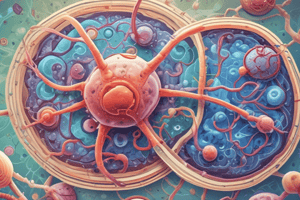Podcast
Questions and Answers
Urinary tract infections are more common in ______ than in ______ because of the anatomical position of the female urethras that are shorter and closer to the anus.
Urinary tract infections are more common in ______ than in ______ because of the anatomical position of the female urethras that are shorter and closer to the anus.
girls/women, boys/men
Genital infections can be caused by a wide variety of ______.
Genital infections can be caused by a wide variety of ______.
microbes
Elderly men who have trouble emptying their bladders because of prostate enlargement and for those who have indwelling ______ are also at a higher risk.
Elderly men who have trouble emptying their bladders because of prostate enlargement and for those who have indwelling ______ are also at a higher risk.
catheters
People who do not drink adequate fluids are also at risk for ______.
People who do not drink adequate fluids are also at risk for ______.
The genitourinary tract is consisting of the ______ and the genital tract.
The genitourinary tract is consisting of the ______ and the genital tract.
Flashcards are hidden until you start studying
Study Notes
Urinary Tract Infections (UTIs)
- UTIs are more common in women than in men due to the shorter and closer proximity of the female urethra to the anus.
Risk Factors for Genital Infections
- Genital infections can be caused by a wide variety of pathogens.
High-Risk Groups for UTIs
- Elderly men with prostate enlargement are at a higher risk of UTIs due to difficulty emptying their bladders.
- Individuals with indwelling catheters are also at a higher risk of UTIs.
Preventing UTIs
- Drinking adequate fluids is essential in preventing UTIs.
Anatomy of the Genitourinary Tract
- The genitourinary tract consists of the urinary tract and the genital tract.
Studying That Suits You
Use AI to generate personalized quizzes and flashcards to suit your learning preferences.



